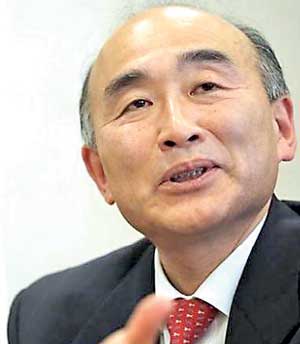19 Jul 2017 - {{hitsCtrl.values.hits}}
The International Monetary Fund (IMF) yesterday said another round of interest rate hike would be “desirable” to rein in inflation and private credit as its Executive Board completed the second review of Sri Lanka’s economic performance under a US $ 1.5 billion three-year
extended arrangement.
 The completion of the review enables the disbursement of the third tranche, which amounts to US $ 167.2 million. The IMF delayed the disbursement of the tranche until the Sri Lankan government tabled the new Inland Revenue Bill in parliament.
The completion of the review enables the disbursement of the third tranche, which amounts to US $ 167.2 million. The IMF delayed the disbursement of the tranche until the Sri Lankan government tabled the new Inland Revenue Bill in parliament.
The new bill will replace the country’s existing income tax and is expected to accrue more revenue for the government and trim tax holidays and exemptions.
The bill, which is said to have been developed with the help of the IMF, was tabled in parliament this month. But its passage in the House could see another round of battles between the lawmakers of the two main political parties of the government as the cracks have started appearing within the
ruling coalition.
Late last year, the IMF delayed the second tranche of the bailout package until the government increased the value added tax from 11 percent to 15 percent. As the government has been able to bring reforms to both the VAT and the income tax while meeting revenue targets set by the IMF, the Fund’s Acting Chair and Deputy Managing Director, Mitsuhiro Furusawa said Sri Lanka’s performance under the fund-supported programme had been, ‘broadly satisfactory’, and macroeconomic and financial conditions had been stable, despite severe weather events and global market volatility.
“The authorities launched fundamental income tax reform, undertook meaningful corrective actions to achieve programme targets on international reserves, and remain committed to the reform programme. Going forward, the reform momentum should strengthen further with greater ownership, building on the progress made so far”, he added.
However the IMF wants further revenue based consolidation of the government’s budget and structural reforms into tax administration and pricing of energy as Sri Lanka operates with a very high debt burden.
Moody’s Investors Services recently in note on Sri Lanka showed how the state-owned enterprise debt, which accounts for as much as 14 percent of the Gross Domestic Product, has been a major drag on the budget and a course for economic instability that creates inflation and burden the public. It remains to be seen whether the government would be able to meet the IMF imposed 4.7 percent fiscal deficit target for this year although the first four months’ performance is broadly on target.
The IMF wants the Sri Lankan government to bring down the fiscal deficit to 3.5 percent by 2020, a likely feat if no major derailment in the fiscal consolidation path takes place during the few years to come.
The Fund still sees the country’s inflation and the growth in private credit to be, ‘on the high side’, although there are clear signs of both slowing down in response to recent monetary tightening measures. But the IMF said ‘further tightening is desirable’.
Sri Lanka’s private sector credit reached all time highs during 2015 and 2016 continuing through the first quarter of 2017 due to relaxed monetary and fiscal policies. But the recent tightening measures appeared to have taken effect as the April private credit fell to Rs.19 billion from Rs.82 billion in March.
Due to these extremely higher credit growth recorded during the last couple of years, the Lankan banks saw their capital adequacy getting weakened—a development noted by the IMF. However the fund said the country’s financial soundness indicators remain stable but wants the Central Bank to strengthen the financial sector supervision. Meanwhile, in completing the review, the Executive Board granted a waiver of nonobservance of the continuous performance criterion on accumulation of external arrears which was missed due to continued difficulties of establishing a payment platform and waivers of applicability of the performance criteria for end-June 2017 on floor of the central government primary balance and the programme net official international reserves of the Central Bank of Sri Lanka, given the unavailability of the information necessary to assess observance.
09 Jan 2025 2 hours ago
09 Jan 2025 4 hours ago
09 Jan 2025 6 hours ago
09 Jan 2025 6 hours ago
09 Jan 2025 7 hours ago